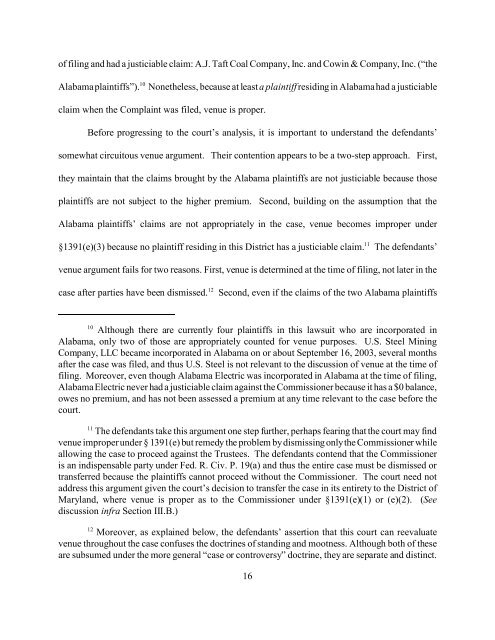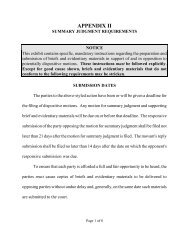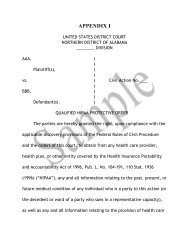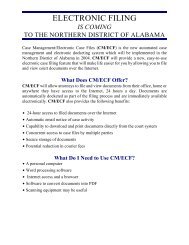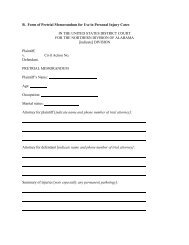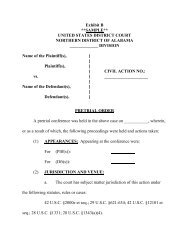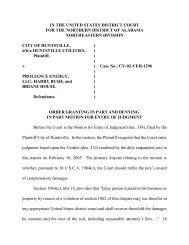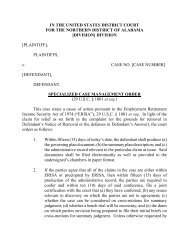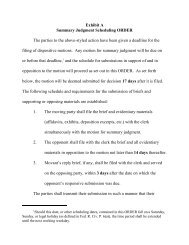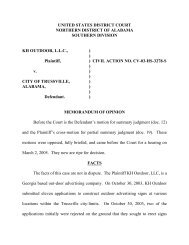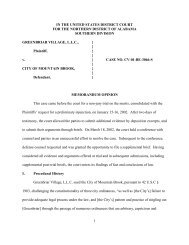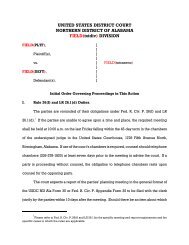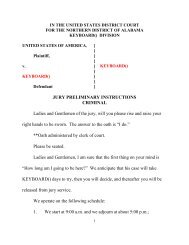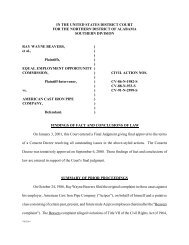Memorandum of Opinion - Northern District of Alabama
Memorandum of Opinion - Northern District of Alabama
Memorandum of Opinion - Northern District of Alabama
You also want an ePaper? Increase the reach of your titles
YUMPU automatically turns print PDFs into web optimized ePapers that Google loves.
<strong>of</strong> filing and had a justiciable claim: A.J. Taft Coal Company, Inc. and Cowin & Company, Inc. (“the<br />
<strong>Alabama</strong> plaintiffs”). 10 Nonetheless, because at least a plaintiff residing in <strong>Alabama</strong> had a justiciable<br />
claim when the Complaint was filed, venue is proper.<br />
Before progressing to the court’s analysis, it is important to understand the defendants’<br />
somewhat circuitous venue argument. Their contention appears to be a two-step approach. First,<br />
they maintain that the claims brought by the <strong>Alabama</strong> plaintiffs are not justiciable because those<br />
plaintiffs are not subject to the higher premium. Second, building on the assumption that the<br />
<strong>Alabama</strong> plaintiffs’ claims are not appropriately in the case, venue becomes improper under<br />
§1391(e)(3) because no plaintiff residing in this <strong>District</strong> has a justiciable claim. 11 The defendants’<br />
venue argument fails for two reasons. First, venue is determined at the time <strong>of</strong> filing, not later in the<br />
case after parties have been dismissed. 12 Second, even if the claims <strong>of</strong> the two <strong>Alabama</strong> plaintiffs<br />
10<br />
Although there are currently four plaintiffs in this lawsuit who are incorporated in<br />
<strong>Alabama</strong>, only two <strong>of</strong> those are appropriately counted for venue purposes. U.S. Steel Mining<br />
Company, LLC became incorporated in <strong>Alabama</strong> on or about September 16, 2003, several months<br />
after the case was filed, and thus U.S. Steel is not relevant to the discussion <strong>of</strong> venue at the time <strong>of</strong><br />
filing. Moreover, even though <strong>Alabama</strong> Electric was incorporated in <strong>Alabama</strong> at the time <strong>of</strong> filing,<br />
<strong>Alabama</strong> Electric never had a justiciable claim against the Commissioner because it has a $0 balance,<br />
owes no premium, and has not been assessed a premium at any time relevant to the case before the<br />
court.<br />
11<br />
The defendants take this argument one step further, perhaps fearing that the court may find<br />
venue improper under § 1391(e) but remedy the problem by dismissing only the Commissioner while<br />
allowing the case to proceed against the Trustees. The defendants contend that the Commissioner<br />
is an indispensable party under Fed. R. Civ. P. 19(a) and thus the entire case must be dismissed or<br />
transferred because the plaintiffs cannot proceed without the Commissioner. The court need not<br />
address this argument given the court’s decision to transfer the case in its entirety to the <strong>District</strong> <strong>of</strong><br />
Maryland, where venue is proper as to the Commissioner under §1391(e)(1) or (e)(2). (See<br />
discussion infra Section III.B.)<br />
12<br />
Moreover, as explained below, the defendants’ assertion that this court can reevaluate<br />
venue throughout the case confuses the doctrines <strong>of</strong> standing and mootness. Although both <strong>of</strong> these<br />
are subsumed under the more general “case or controversy” doctrine, they are separate and distinct.<br />
16


